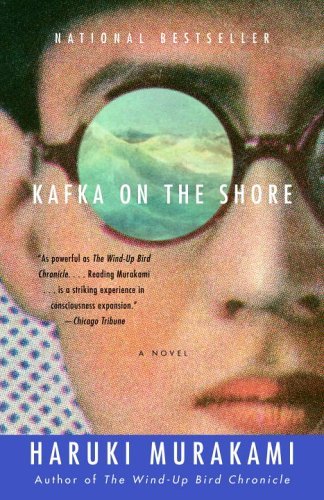Smitten by Haruki Murakami’s novel 1Q84, I ran out and bought the author’s Kafka on the Shore (from “The Avid Reader” bookstore in Davis, California). I don’t like Kafka as much as 1Q84, but it has some wonderful passages—such as the one below which rips into rigid ideologues.
Murakami’s character Oshami dissects two confrontational feminists, which reminds us that ideological thinking occurs on the Left as well as the Right. Indeed, the term “political correctness” was originally applied to 1980’s leftwing ideological pronouncements. But as so often in history, the political pendulum has swung and now America’s Right is more guilty than the Left of “intolerance, theories cut off from reality, empty terminology, usurped ideals, inflexible systems.”
One of Literature’s strengths is that it calls us to be truthful, authentic, independent, and brave. Talking about his own victimization by stereotypes, Oshima, who is a man in a woman’s body, tells the 15-year-old narrator (Kafka) that prejudice is not his major concern. What most bothers him about haters is their lack of imagination, their emptiness:
“I’ve experience all kinds of discrimination,” Oshima says. “Only people who’ve been discriminated against can really know how much it hurts. Each person feels the pain in his own way, each has his own scars. So I think I’m as concerned about fairness and justice as anybody. But what disgusts me even more are people who have no imagination. The kind T. S. Eliot calls hollow men. People who fill up that lack of imagination with heartless bits of straw, not even aware of what they’re doing. Callous people who throw a lot of empty words at you, trying to force you to do what you don’t want to. Like that lovely pair we just me.” He sighs and twirls the long slender pencil in his hand. “Gays, lesbians, straights, feminists, fascist pigs, communists, Hare Krishnas—none of them bother me. I don’t care what banner they raise. But what I can’t stand are hollow people. When I’m with them I just can’t bear it, and wind up saying things I shouldn’t. With these women—I should’ve just let it slide . . . but I just can’t do that. I say things I shouldn’t, do things I shouldn’t do. I can’t control myself. That’s one of my weak points. Do you know why that’s a weak point of mine?”
“’Cause if you take every single person who lacks much imagination seriously, there’s no end to it,” I say.
“That’s it,” Oshima says. He taps his temple lightly with the eraser end of the pencil. “But there’s one thing I want you to remember, Kafka. . . . Narrow minds devoid of imagination. Intolerance, theories cut off from reality, empty terminology, usurped ideals, inflexible systems. Those are the things that really frighten me. What I absolutely fear and loathe. Of course it’s important to know what’s right and what’s wrong. Individual errors in judgment can usually be corrected. As long as you have the courage to admit mistakes, things can be turned around. But intolerant, narrow minds with no imagination are like parasites that transform the host, change form, and continue to thrive. They’re a lost cause . . .
Intolerant, narrow minds with no imagination are also threatening America’s host. Do we have the intelligence and courage to stand up to them?
And when I say “them,” I include those instances when “them” shows up in us.


